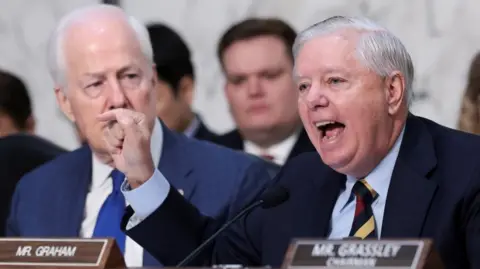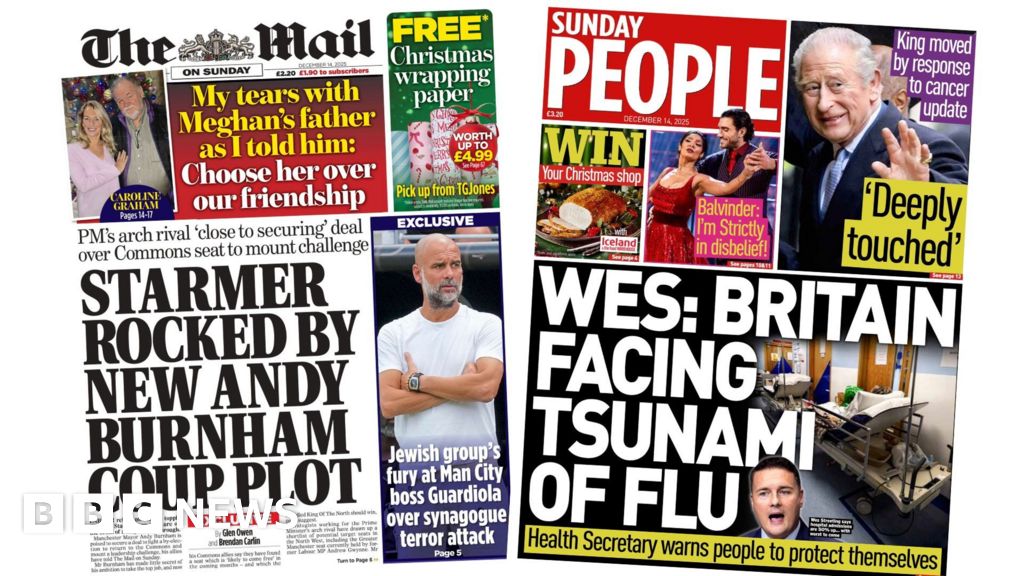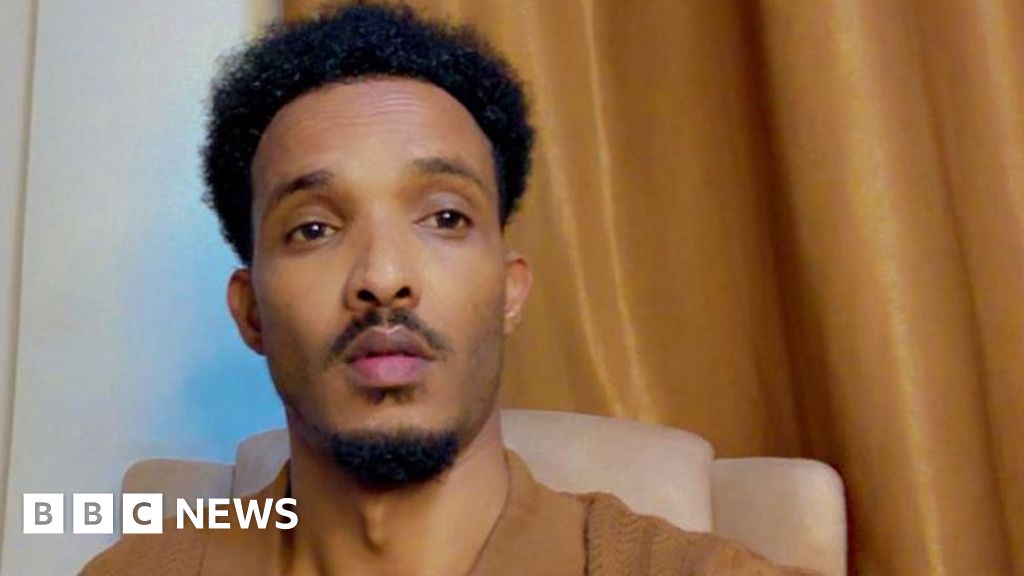Anthony ZurcherNorth America correspondent
Watch: Key moments from Pam Bondi's tense Senate hearing
Pam Bondi's testimony before the Senate Judiciary Committee was expected to be a contentious, partisan affair. It lived up to that billing.
It was the attorney general's first appearance at a congressional oversight hearing - and it was a timely one.
Two weeks ago, her justice department indicted former FBI Director James Comey, triggering an outcry from Democratic politicians.
Her testimony on Tuesday also came just a day after a group of former justice department employees released a letter accusing Bondi of helping to take a "sledgehammer" to "longstanding work the department has done to protect communities and the rule of law".
Nerves were raw, and Bondi was clearly ready for a fight. Here are five takeaways from the hearing.
1) Bondi goes on the attack
Recent Trump administration officials, including Health Secretary Robert F Kennedy Jr and FBI Director Kash Patel, have relied on a clear playbook for testimony before hostile congressional committees.
Go on the attack early and often.
That strategy was on display throughout Bondi's testimony. When pressed on National Guard deployments, she said she wished Illinois Senator Dick Durbin and California Senator Alex Padilla loved their states "as much as they hate Donald Trump".
When questioned about Jeffrey Epstein, she noted that several Democratic senators had taken money from deep-pocketed donors who had ties to the late convicted sex trafficker.
Bondi launched a series of pointed attacks on senators as they questioned her.
And when it was time for junior Vermont Senator Peter Welch to ask questions, he began by observing Bondi's penchant for launching personal attacks.
"I'll be waiting for my turn," the soft-spoken New Englander said. "But you don't have to do it now".
Watch: Trump says “there will be others” after Comey indictment
2) Lots of questions, few answers
When Bondi wasn't going on the attack, she frequently declined to comment on questions from both Democrats and Republicans.
She said she wouldn't discuss "personnel matters" when questioned about the spate of senior level justice department firings, including top FBI officials and a US lawyer who had recommended against the Comey indictment.
She wouldn't comment on "ongoing investigations" and legal proceedings – including the Comey case. She also wouldn't shed light on conversations she has had with the president or other White House aides.
When presented with a large photograph of her sitting at a table with the president the day after Trump had penned a Truth Social post calling for her to indict Comey, her only remark was that she loved the picture.
"This is supposed to be an oversight hearing where members of Congress can get serious answers to serious questions," California Senator Adam Schiff said, after listing all the questions that Bondi had refused to answer.
"I think you owe the president an apology for your entire career," Bondi replied.
3) Bondi keen to focus on crime
Bondi appeared determined to focus on what she said was the Trump administration's goal of reducing crime in the US.
She was quick to cite statistics that she said showed the successes they have had so far – the number of arrests in Washington DC, the drug crackdowns and illegal firearm confiscations in Chicago, the drug seizures at the border.
"We are returning to our core mission of fighting real crime," Bondi said.
- Trump urged prosecutors to target Comey. Now he's been charged
- Trump pushes justice department to prosecute his political opponents
Democrats may have had other ideas, but Bondi - and the White House - likely feel they are on the safest political ground when they talk about crime-fighting.
It is an issue that, according to the polls, many Americans care about – and one that has the potential to appeal not just to die-hard conservative partisans, but to independent and Democratic voters as well.
4) But Democrats focus on Epstein
A source of particular heat for Bondi over the past few months has been the justice department's handling of its investigation into Epstein, who before his death had well documented ties to many rich and powerful Americans.
For most of the hearing, Democrats were the ones peppering Bondi with Epstein-related questions.
Senator Sheldon Whitehouse wanted to know if the FBI had discovered pictures of Trump and "half-naked young women", and whether the justice department had looked into "suspicious activity reports" about Epstein's finances.
Bondi wouldn't answer.
Dick Durbin asked about claims that the justice department had flagged anything in its Epstein documents related to Trump to the president.
"I'm not going to discuss anything about that with you, senator," Bondi replied.
The attorney general was asked why her department now says there is no list of Epstein's clients after she earlier claimed to have that information on her desk.
Bondi responded by citing the department's previous finding that there was no evidence of conspiracy or a cover-up surrounding the investigation.

 Reuters
Reuters
The hearing was testy - with both parties attacking the other in their questioning
The questions still swirling around the Epstein investigation have been a rare source of bipartisan interest, with some Republicans joining Democrats to call for more transparency. It took a while, but this Senate hearing finally gave some indication of that.
Republican Senator John Kennedy of Louisiana recounted recent comments by Commerce Secretary Howard Lutnick that Epstein was "the greatest blackmailer ever".
The Louisiana senator suggested Lutnick, who owned a home near Epstein in Palm Beach Florida, should testify before Congress and speak to the FBI.
Bondi continued her Epstein dance, saying it was up to Lutnick and FBI Director Kash Patel to decide if a meeting was necessary.
5) Republicans look back in anger
If Democrats were focused on what they view as the unprecedented weaponisation of the justice department under Trump, most of the Republican senators were more interested in fighting battles from the Biden presidency – or earlier.
Iowa Senator Chuck Grassley spent much of the hearings interjecting on how Democrats had, in his view, stonewalled investigations into the Biden family's business dealings.
South Carolina Senator Lindsey Graham condemned the FBI's Russia investigation following the 2016 presidential election. Ted Cruz of Texas focused on protests outside the homes of conservative Supreme Court justices in the wake of their 2021 decision overturning abortion rights.
Eric Schmidt of Missouri filled out a veritable bingo card of right-wing complaints directed at the justice department.
Bondi, for her part, wholeheartedly agreed with the Republican chorus.
When the five-hour hearing finally concluded, the event had the feeling of a partisan house of mirrors, with each side accusing the other of political weaponisation and partisan prosecutions.
"The Department of Justice is supposed to be the nation's guardian of fairness and the rule of law," Senator Alex Padilla said during his questioning. "When the public trust breaks down, then justice itself is at risk."
It is the kind of comment that both Republicans and Democrats on the committee could agree with – before casting the other side as the source of the nation's ills.
.png)
 2 months ago
13
2 months ago
13








 English (US) ·
English (US) ·